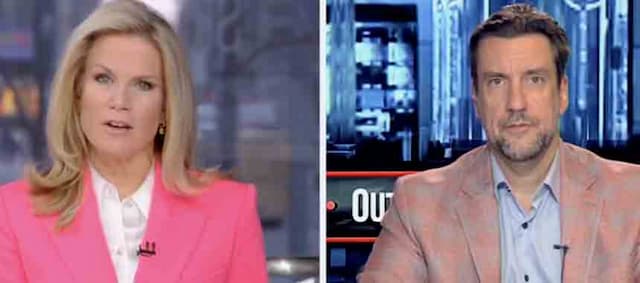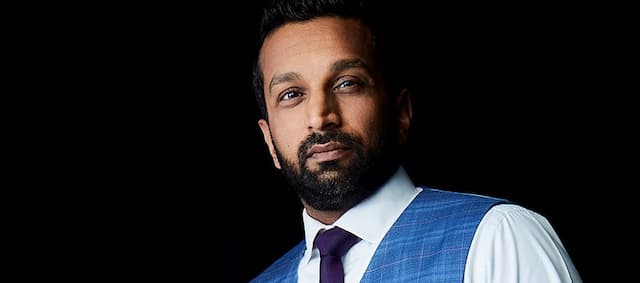Veterans Flood the Phone Lines to Vent on Afghanistan
CLAY: Let’s start with David in Superior, Wisconsin. David, what is your reaction watching all this unspool in front of us?
CALLER: What a slap in the face to every Gold Star family that lost a loved one over there. Guys, you asked earlier, “How is it that they didn’t know?” The answer is, “They did. They knew exactly what would happen and how long it would take.” (garbled cell) Why the chaos? Why all this? Let’s not make any mistake.
Going forward, for all these Marxists in government — in this government here — China is the model. So that’s all you have to do. There’s been news blurb after news blurb that for the past three or four weeks about China’s designs on Afghanistan. You combine that with the fact, how many…? (cell drops)
CLAY: I think we lost David. Yeah.
BUCK: Let’s get Mike in Georgia. Mike also served in Afghanistan. Mike, what branch?
CALLER: Hey, guys. How you doing? So I just actually retired last month from the Army. I spent 22 years as an infantryman, a lot of my adult life in Afghanistan.
BUCK: Well, God bless you. Thank you for your service, Mike.
CALLER: I appreciate it, guys. In looking at… I think you guys have nailed it on the head with everything you’ve been saying. If the administration and all their top advisers and insert-really-cool-job-description here and there, if they didn’t see it coming, they’re either ignorant or they’re lying to the American faces.
I say that because if you took any random private, infantryman, whoever from 82nd, 101st, insert major division here, who’s been on the ground in Afghanistan and asked them, “Could the Taliban take the country in a weekend if we threw our hands up and said, ‘We’re done’?” Every one of them would say, “Absolutely.” As soon as we’re done fighting, the guys who have seen it know how fast the Taliban masses power, how quickly they move, and how effective they can be. So if an 18-year-old private could call it and say (garbled cell).
 CLAY: I think we lost him a little bit too. Thanks for the service, Mike in Georgia. Again, we are taking calls. Primarily we’d like to hear from people who actually served in Afghanistan. Buck, we were talking with you. You were over in Afghanistan, uniquely, for a lot of people who sit around and talk about Afghanistan today. As the weekend took place for you, what was your primary emotion?
CLAY: I think we lost him a little bit too. Thanks for the service, Mike in Georgia. Again, we are taking calls. Primarily we’d like to hear from people who actually served in Afghanistan. Buck, we were talking with you. You were over in Afghanistan, uniquely, for a lot of people who sit around and talk about Afghanistan today. As the weekend took place for you, what was your primary emotion?
BUCK: The biggest thing for me was that having seen it at the 30,000-foot policy level as a CIA guy who was interacting a lot with the top people in country, the top military command staff, I just think of all the times that I saw people saying, “The same thing keeps happening here.” The new leadership comes in and says, “We’ve figured it out,” Clay.
“Now we know. We’ve got the recipe for success. A sustainable and defensible Afghanistan with liberal democracy is in our sights. We’re getting there. We’re getting there. We figured it out,” and then there’d be deterioration; the moment somebody would actually look under the rock, so to speak, they’d see problems. That cycle played out every year for a decade.
That’s what I was thinking over the weekend, that the brass, the top military command folks, top intel folks — oh, yeah, lots of that, too — said what the people in D.C. wanted to hear. And what the defense contractors wanted to hear, and they didn’t tell people, was, “This is not sustainable unless we stay forever,” ’cause, remember, they kept saying, “Six more months. Six more months.” It wasn’t 60 more years. And, in essence, some of the people that were saying that, at least they were being honest, right?
CLAY: Right.
BUCK: “Stay forever.” Stay forever was an option but the American people didn’t want that option. That’s what ended up happening.
CLAY: I don’t think the decision about whether or not to leave Afghanistan is secondary to me to finding a way to leave without destroying America’s at least idea of competence around the world, right? There were ways that a well-managed departure from Afghanistan could have occurred.
BREAK TRANSCRIPT
BUCK: Jordan in Houston, Texas. Jordan, welcome.
CALLER: Hi. Hi, Clay and Buck. I have to apologize if I get a little emotional talking today. I didn’t realize I was gonna feel so much emotion. But 14 years ago, I was severely wounded by a suicide bomber in Afghanistan, and I watched my best friend, Sergeant First Class Jason Fetty jump on him, and he survived the suicide bombing and he saved my life and the lives of countless others.
I ended up naming my son Jason after him, and I’m just feeling angry and sad. (choking up) I did two tours Iraq and one Afghanistan, and I just… I’m let down by our government. I’m let down by our military leaders. Everyone wants to blame the president. I think there’s definitely blame to go there, but just last month our leaders were telling us that everything was gonna be okay and the Army could stand up. And they collapsed. And it’s just… It’s sad and it’s frustrating.
 BUCK: Jordan, let us just say here, first of all, thank you for being a hero and being a warrior for this country. God bless you for calling in and sharing your with everybody across the country. You got a lot of brothers and sisters in uniform right now who are listening to you whose hearts are going out to you. I can assure you of that. What do you think should have happened here, Jordan? If things had gone the way that you wanted, what do you feel like the Biden administration should have done? What does an honorable exit look like, in your mind?
BUCK: Jordan, let us just say here, first of all, thank you for being a hero and being a warrior for this country. God bless you for calling in and sharing your with everybody across the country. You got a lot of brothers and sisters in uniform right now who are listening to you whose hearts are going out to you. I can assure you of that. What do you think should have happened here, Jordan? If things had gone the way that you wanted, what do you feel like the Biden administration should have done? What does an honorable exit look like, in your mind?
CALLER: Well, that’s just loaded question. I think there’s so much responsibility on the other administrations, too, but I definitely think we should have done a better job of securing it. I think we shouldn’t have given them BAS, Bagram airfield. I think we should have kept that secure. And I definitely think we should have kept a small contingent to try to get everyone out.
But in reality, I think — a couple of folks have alluded to this — we accomplished everything we needed to in the first few years, and then we’re still there for 20 years slugging it out. It’s just really, really sad. I’m just feeling so much emotion. I had talked to… I got a message from my interpreter last night. He made it out a few years ago with his wife and kids but now his family is in danger of being found by the Taliban, and it’s just a crushing blow.
CLAY: Thank you for the service, Jordan, and I think you spoke — and speak — for a lot of different veterans out there. We’re trying to let you guys weigh in. Leslie in San Antonio, also a vet. We only want veterans of Afghanistan to call in today to react to what’s going on. 1-800-282-2882. Your thoughts, Leslie?
CALLER: Hi, Buck. Hi, Clay. Thank you for taking over for Rush. I really appreciate your being there, and I also wanted to thank Jordan for being a very brave hero. I am not a hero. I was just a somebody. I was a Navy vet, but I had the pleasure of serving in both Iraq and Afghanistan.
But my perspective is a little bit more unique. I was a child in Iran. Part of my family and I got to see the Middle East before it descended into terrorism. So what I wanted to say today, basically, is that I saw the Middle East at peace. It wasn’t perfect, but my entire family was in Iran because it was safe for families for people from all over the world.
When Carter, a Democrat, abandoned Iran and the Shah, it removed the linchpin to peace in the entire Middle East. And now Biden has also abandoned Afghanistan, and it’s descended into a furious flame that I’m afraid will blow back onto us and the rest of the world. In Afghanistan —
CLAY: I think there’s a lot of truth to that, Leslie.
CALLER: And let me share a particular experience I had at Camp Leatherneck. We opened a cultural center for the Afghan people. We had a wonderful party that included our Marine leadership as well as the Afghan leadership and civilians. I spoke to many of our fellow Afghans, the interpreters that we’re talking about today — both men and women, by the way — and many have been alive during the time of the Shah in Afghanistan.
They were boys and girls who went to school. They were men and women who were able to go to college and become doctors and professionals. Part of this opening ceremony to the cultural center included a huge wall of photos of Afghanistan in the sixties, pre-Taliban. There was a mutual respect between our military leadership and the Afghan leadership.
Yeah, when I was in Leatherneck we had green-on-green aggression, and it was far from perfect. But we were actually making headway, I felt. And so, yes, it was a long-term commitment. And, unfortunately, I think today we’re gonna be feeling the aftereffects of the abandonment that Biden has put Afghanistan and the rest of the world into.
BUCK: Leslie, thank you for your service and for your unique perspective on all this. We appreciate you calling in. Let’s get Grant in Maine. Grant, welcome to the Clay Travis & Buck Sexton Show.
CALLER: Hi, guys. Thanks for taking my call. So obviously this is horrible. It’s a horrible, epic failure and embarrassment on this administration. But I’ve kind of been looking at something different. I’ve been looking at the fact that the media now all the sudden is warning everybody about the possibility of terror attacks on American soil. “Watch out for the terror attacks!”
And to me it seems like we’re being set up. It seems like they wanted this to go this way. They wanted the failure because they want to keep the War on Terror going. Because if it went smoothly, there’d be no more War on Terror. And then what would they have to do? But now it seems like they’re just pumping it back up. So are we facing another 20 years of War on Terror and taking it from a different angle? That’s my concern. Thanks.
BUCK: Grant, I appreciate it. I will never forget unfortunately in terms of authoritarianism they’re getting plenty of mileage out of the war on covid right now as in the lockdowns and the mandates for vaccines and all the rest of it. But you could be right that there will be a crackdown on civil liberties at some point in the future or a crackdown on liberties in general if, in fact, Afghanistan does turn back into a terror platform and all the sudden we’re back in that GWOT posture. But that’s getting a few steps ahead, I think, of where we are today. But thank you for calling in. Clay, what do you think?
CLAY: Let’s get couple more calls here. It is emotional, I know, for so many veterans of Afghanistan to be watching 20 years of American effort as it is falling apart in this way. Aaron in Syracuse, New York. Three tours in Afghanistan for you, Aaron. What are your reactions as you see all of this unspooling?
 CALLER: Hey, gentlemen. It’s great to talk to you. One of the things that I experienced when I was over there was, we actually… I’m a veteran of the Marine Corps. We actually ran the Afghan national security force training academy and like an advisement academy. And there was a little bit of mismanagement as far as how we had tried to essentially inflict a Western ideology into more or less a tribal mentality.
CALLER: Hey, gentlemen. It’s great to talk to you. One of the things that I experienced when I was over there was, we actually… I’m a veteran of the Marine Corps. We actually ran the Afghan national security force training academy and like an advisement academy. And there was a little bit of mismanagement as far as how we had tried to essentially inflict a Western ideology into more or less a tribal mentality.
Some of the things we could have done better. We had the Afghan national police, the Afghan national border patrol, which were weak to begin with and very heavily propped up by NATO. But because they came from a tribal system, they would look at the colors of their uniforms and they would start to feud. And we never really dealt with that.
The internal feuding of the organizations as we developed our training structure going on, ’cause we’d been running, essentially — like the previous caller on Camp Leatherneck, we’d been running — that academy for the better part of a decade. And a lot of the smaller and simpler things that we could have done to improve the Afghan forces so that we wouldn’t be in this position right now, I think we really failed to do.
I think a lot of that was because it was so heavy-handed by NATO as a whole. They didn’t give the Marine leadership and the Army leadership and the Navy leadership the ability to actually sit down and correct inefficiencies that they saw. In reality what they did was it was mandated based off of NATO. And I think that’s part of what’s led us here today where we are now have security forces that essentially can’t stand on their own two feet.
CLAY: Thank you for your call, Aaron.
BREAK TRANSCRIPT
CLAY: Michael in Abilene, Texas. Michael, what you got for us?
CALLER: Hey, how you guys doing?
CLAY: Excellent.
CALLER: Yeah. I just want all the other veterans out there to know, we didn’t abandon Afghanistan. We were just following our orders. We did what we could do, and all we can do right now is just pray for that country to hopefully get a taste of freedom again and basically just continue to live ours. This is probably the hardest thing yet. Every time we try to accomplish something, it’s just a stab in the back. You know… (sigh) I just… My heart’s for our brothers and sisters and for the country of Afghanistan.
CLAY: Thank you for your service, Michael. Bill in San Antonio is also a veteran. He’s been waiting for awhile. Bill, what you got for us?
 CALLER: (garbled cell) I have a couple statements here make real quick and get your thoughts on it. I don’t think that holding public office makes someone immune from hating our country, reference mainly to The Squad, Rashida Tlaib, Alexandria Cortez, and Ilhan Omar. Now that the Taliban has taken over, they have in their possession our (garbled) drones that we left behind.
CALLER: (garbled cell) I have a couple statements here make real quick and get your thoughts on it. I don’t think that holding public office makes someone immune from hating our country, reference mainly to The Squad, Rashida Tlaib, Alexandria Cortez, and Ilhan Omar. Now that the Taliban has taken over, they have in their possession our (garbled) drones that we left behind.
There are some howitzers which may be left with some AI-guided rounds, and on July 28, the co-founder for the Taliban met with the Chinese foreign minister. So if they are establishing ties with China, could this not be some sort of a back-door arms trade with China to give them more technology than we have (garbled).
BUCK: China… Bill, thank you, by the way. China is going to view Afghanistan the way it does every other country and interacts with which is just from a purely, “What benefits us? We don’t care about anything else, human rights or, you know, the international community perspective.” So they’re gonna want resources in Afghanistan.
They’re gonna view this as an opportunity to push their influence in the region. But there’s a lot of players — it’s not just China — that are gonna have a very strong hand in dealing with the Taliban going forward. Pakistan is certainly top of the list. The Iranians tend to, because the Iranians are Shi’a, of course, they do not like the Sunni Muslim Afghani Taliban or the Pakistani Taliban.
But there’s gonna be a whole bunch of countries jockeying for influence, but certainly China is gonna be a major player in that process as well. Thank you, Bill, for calling in. And we also have Charlie in Kansas City, Missouri. Hey, Charlie.
CALLER: Hey, how you guys doing today?
BUCK: We’re good. Thank you. What’s on your mind?
CALLER: Hey, I’m a big military family. I’m retired military 32 years. We have a family of six, five are servings. Our brother-in-law, retired SF. I’m retired from the infantry line of work. But I tell you, I’ve done multiple trips overseas. My son just got deployed with 82nd due to this mess that’s going on right now and he’s an infantry officer.
Bottom line, we need to, A, totally get out of there. Let these kids take care of themselves or if we go back in… The problem I have seen in the different places I’ve been, we have not had enough resources, and we have not had enough men to do the job that’s out there in a timely fashion. Our current president is a complete moron for, A, pulling everybody out of there.
If we go back in, let’s go in there and spank these kids — the Taliban, I mean — and do what we gotta do and get the job done and over with. If not, totally pull out of there. Sometimes, you know, like with our own children. They have to grow up. You push ’em out of the nest for them to take care of themselves.
You know, and I don’t want these people — thousands and thousands — getting on a plane and coming back to our country because what’s gonna end up happening is that you’re gonna have some of the Taliban mixed in with the, quote-unquote, good people coming in. So you’re gonna have these wolves mixed in with sheep, if you know what I mean.
 CLAY: Yeah. No doubt. And thank you, by the way. Buck, we’ve had so many different veterans who have been weighing in. We wanted to get as many different of your calls as we could. And we want to thank for their service and let you know that unlike a lot of people in the media, we’re not just gonna abandon the story in (chuckles) two days, right?
CLAY: Yeah. No doubt. And thank you, by the way. Buck, we’ve had so many different veterans who have been weighing in. We wanted to get as many different of your calls as we could. And we want to thank for their service and let you know that unlike a lot of people in the media, we’re not just gonna abandon the story in (chuckles) two days, right?
Like, this is a major threat going forward. Buck, you probably don’t need to hear it from me, but of all the people who are talking on the radio today about Afghanistan, you have direct personal experience in Afghanistan, candidly, in a way that very few do, which is why I think it’s important to let you have the final closing thoughts here.
BUCK: Well, I appreciate that, Clay. Yeah my time on the CIA’s Afghanistan desk was certainly eye opening. And what we’re seeing right now — in essence, now, looking at it from the perspective of somebody who was reading the reported and getting a sense from the generals on down of what was really happening in the country, and speaking to different SF units and guys who are out there on the front lines about what they were seeing.
This notion of building an Afghanistan that was going to be able to stand on its own ever was just… It looks like a fiction now, and it should have been clear to the American people a long time ago that that’s what our leadership was pushing us into. But as you said, we’ll continue to follow this story in the days ahead. It’s gonna be… It has massive implications, not just for the international community, but, of course, for the U.S., its view of itself and the world and domestic politics too.





